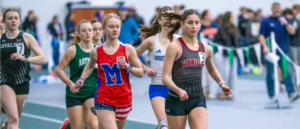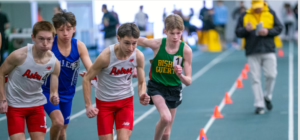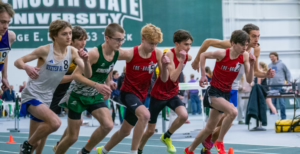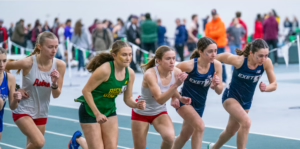by Mike Smith
What it takes
On Saturday, November 19th, I had the opportunity to watch the men’s and women’s NCAA Division 1 cross country championships. I suppose everyone has that opportunity, and it would be great for me to say that I was in Stillwater, OK doing so, but no, I was back in New Hampshire. However, being both a cheapskate and someone who doesn’t feel he should have to pay to watch running, I simply was at the New Hampshire Track and Field Coaches Association’s winter coaches clinic and it was being streamed on Youtube TV. I got to watch Parker Valby of Florida gamely build up a 12 second lead only to have Katelyn Touhy of NC State chase her down over the final 2K and kick away to a three second victory. Touhy also led her team, affectionately known as the Wolfpack to a repeat championship.
On the guys side, I watched NAU’s Nico Young and Drew Bosley push from the front, with only Stanford’s Charles Hicks holding on, trading surges throughout the race. NAU were looking to repeat but were only ranked fourth, so had to take a shot rather than protect a lead. In the end Hicks was able to pull away in the final couple hundred meters, while Young and Bosley would follow shortly behind. And watching the live scoring I was able to witness a race that was tightening up the entire 30 minutes the race was run, with Oklahoma State closing up on NAU over the last 2k so much so that the race ended in a tie, 83 to 83. This is something that has never happened before for first in Division 1s and ended up being won by NAU by looking at the head to head wins of the top five scorers.
It was a phenomenal day of racing, probably the most exciting action I’ve ever seen on both sides of the championships. I was blown away by the gutsy racing, the precision application of 16 weeks (and more) of specific training, all leading up to this one day. I loved both the way all 31 teams battled for supremacy interwoven with the camaraderie and respect between competitors who minutes before were trying to grind each other into the ground. For these reasons I believe cross country is the absolute best sport, no need or reason to try to convince me otherwise.
But in the subsequent days as the interviews and aftermath settle out, and the different entities reflect and report on how things unfolded, starting to prescribe the whats and whys, prepping and planning for next year, I’ve been seeing and hearing some stuff, that as a coach I just love hearing.
In interviews, both coaches for the tying men’s team, Dave Smith of OSU and Mike Smith of NAU, recognized the magnitude of the score, and acquiesced that they each did the best they could and were proud of their teams performance regardless of the outcome.
Looking specifically at the men’s race, with a score that close, it took some time to sort things out, both coaches and their teams had some time to reflect on the possibilities that either winning, or coming in second would mean. With live scoring, while not immediate, you can get a clearer picture of what the result might look like, leaving less to guess and more to know.
In the following interviews, once the results were finalized, both coaches and the NAU team alluded to one of my greatest takeaways from the more exciting culmination to an NCAA cross country season. In the end, once the dust settled and the scoring was complete, who exactly ends up the winner doesn’t really matter.
Now don’t get me wrong. The teams didn’t get together and sing kum by yah with Mike and Dave Smith on lead vocals. No, both Mike Smith and his troops were very excited to hoist the trophy and revel in their sixth title in seven years. However they were very quick to recognize that their season would have been a success either way. Let’s face it, once each team’s fifth guy crossed the line, racing was over, at least points wise. Once George Kusche of NAU crossed the line in 29:34.9, in 39th place (all OSU athletes were in by 32nd place or better) the racing for the championship was over. Each of those teams’ top five had done everything they knew how to in an effort to win the title so even though there was still a race being run, the team championship was over.
But again, in the interviews, both coaches and the NAU team all alluded to the fact that even before they knew the outcome, they were proud of the race they had all run. Brodey Hasty of NAU said they knew they had run their best races and teammate Drew Bosley reflected on how they knew they could do it because they were in it for their teammates. And while you might say that Bosley’s statement was about winning the championship, under the surface it’s more about coming together as a team and going for it.
Let’s face it, there is never any assurance that anything in cross country is going to happen. You could be the class of the field or a complete underdog, but those type casts do not define the outcome once you step to the line. Everyone on the line wants to be the individual winner, but only one can. Without perspective, in the NCAA field of 255 athletes there will be 254 losers. If you look at this without perspective you’d be missing the point.
NAU’s coach, when asked about whether he thought his team could pull it off, after an auspicious start to the season, he said definitively, yes. He admitted that he didn’t have the training right going into Nuttycombe and they tweaked a few things and were building momentum going into the championships. And while he didn’t say that NAU would win, he alluded to the fact that he knew they could win. He knew his team were going to run their a$, er butts off for each other (his words, not mine) and that he felt they would do everything they could for their team. And without saying it, he showed that the rest doesn’t matter.
OSU’s coach Dave Smith echoed those remarks. He said, even before the scoring showed NAU and OSU in a tie, that he knew it was close, and that his guys ran as best they could, that he couldn’t envision a different or better scenario for his team. They had done their job, ran the best race they could, and second to NAU is not a bad place to be. They wished and aimed for first, but again, with 31 teams there are 30 teams that don’t take home the big prize.
It’s important to remember that truth be told, we’re not in it for the winning. Yes, we all want to win but if we look past the journey it takes to get there we’re missing the forest through the trees. The plaque and medals are simply trinkets that identify the result of all the hard work and effort over the many weeks that cumulatively is known as the journey. If an athlete invests in the journey then they will always come away with something useful and meaningful. However if they are only in it for the trinkets, even if they get them, they really miss out on the part of the process where you grow as an individual.
Convincing athletes that the investment is in the journey is getting harder and harder. With star athletes being elevated to hero status, it’s easy for athletes to lose sight of what it takes for everyone else to get there. They don’t see the hours and hours of practice and sacrifice that goes into being the best athlete you can be. They don’t see what it takes.
So it was refreshing to listen to two of the top coaches within the sport I love to embrace the journey over the triumph. NAU could have easily basked in the glory of winning without recognizing the hard work it took to get there. They could have pointed towards the five previous championships and said of course we won. Instead they gave credit where it was due and reinforced the idea that the reason they do it, that the 16 weeks of sacrifice and hard work, running for their teammates, for that greater purpose, is the only thing that mattered over those almost 30 minutes of running.












One Response
Absolutely love this! Is running an individual sport? You bet. Is cross country a team sport? You bet. Do you need to sometimes sacrifice individual glory for the sake of the performance of the team? You better !! Katelyn Tuohy could have gone with Parker Valby from the gun, but she had to protect the team score and couldn’t risk blowing up by focusing on her own desire to win. That’s what being a team player is about.